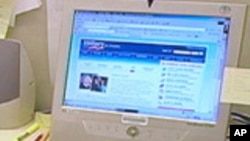<!-- IMAGE -->The Iranian government is stepping up its battle against internet freedom. It is setting up a new police unit to monitor so-called "crimes" committed by Iranian citizens in cyber space. According to the head of the unit, Colonel Mehrdad Omidi, among the offenses to be watched for will be "spreading lies" and "insults" against the Islamic Republic of Iran, two criminal charges often leveled by the Iranian government against political dissidents.
The government of Iran already keeps a tight control on the internet: it has blocked thousands of sites deemed politically unacceptable; it arrests and imprisons on-line journalists for baseless charges; it cuts internet speed to homes and cafes. Reporters Without Borders says Iran is one of the world's worst enemies of internet freedom.
At a town hall meeting during his recent visit to China, President Barack Obama spoke out about the benefits a society receives when freedom of expression, including through the new technologies involving the internet, are respected:
"I am a big believer in technology, and I am a big believer in openness when it comes to the flow of information. I think that the more freely information flows, the stronger the society becomes, because then citizens of countries around the world can hold their own governments accountable. They can begin to think for themselves. That generates new ideas. It encourages creativity."
Mr. Obama said that as President of the United States, there are times it is difficult to hear the criticism that free media allow:
"But the truth is ... I actually believe that that makes our democracy stronger, and it makes me a better leader because it forces me to hear opinions that I don't want to hear. It forces me to examine what I'm doing on a day-to-day basis to see, am I really doing the very best that I could be doing for the people of the United States."
President Obama said that access to information and political participation, like freedom of expression and religion, are core principles which are applicable to every nation. "These freedoms ... are universal rights," said Mr. Obama. "They should be available to all people, including ethnic and religious minorities –- whether they are in the United States, China, or any nation."
The government of Iran already keeps a tight control on the internet: it has blocked thousands of sites deemed politically unacceptable; it arrests and imprisons on-line journalists for baseless charges; it cuts internet speed to homes and cafes. Reporters Without Borders says Iran is one of the world's worst enemies of internet freedom.
At a town hall meeting during his recent visit to China, President Barack Obama spoke out about the benefits a society receives when freedom of expression, including through the new technologies involving the internet, are respected:
"I am a big believer in technology, and I am a big believer in openness when it comes to the flow of information. I think that the more freely information flows, the stronger the society becomes, because then citizens of countries around the world can hold their own governments accountable. They can begin to think for themselves. That generates new ideas. It encourages creativity."
Mr. Obama said that as President of the United States, there are times it is difficult to hear the criticism that free media allow:
"But the truth is ... I actually believe that that makes our democracy stronger, and it makes me a better leader because it forces me to hear opinions that I don't want to hear. It forces me to examine what I'm doing on a day-to-day basis to see, am I really doing the very best that I could be doing for the people of the United States."
President Obama said that access to information and political participation, like freedom of expression and religion, are core principles which are applicable to every nation. "These freedoms ... are universal rights," said Mr. Obama. "They should be available to all people, including ethnic and religious minorities –- whether they are in the United States, China, or any nation."













